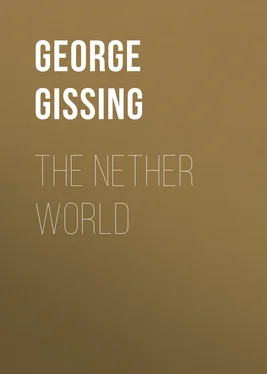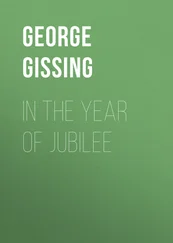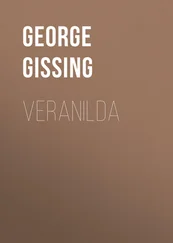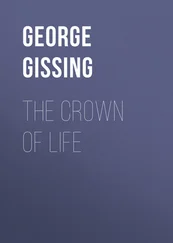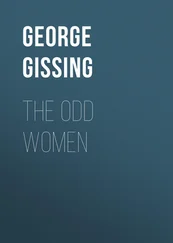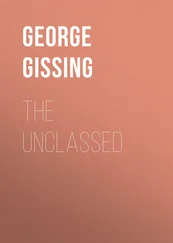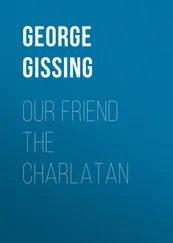George Gissing - The Nether World
Здесь есть возможность читать онлайн «George Gissing - The Nether World» — ознакомительный отрывок электронной книги совершенно бесплатно, а после прочтения отрывка купить полную версию. В некоторых случаях можно слушать аудио, скачать через торрент в формате fb2 и присутствует краткое содержание. Жанр: foreign_prose, literature_19, foreign_antique, на английском языке. Описание произведения, (предисловие) а так же отзывы посетителей доступны на портале библиотеки ЛибКат.
- Название:The Nether World
- Автор:
- Жанр:
- Год:неизвестен
- ISBN:нет данных
- Рейтинг книги:5 / 5. Голосов: 1
-
Избранное:Добавить в избранное
- Отзывы:
-
Ваша оценка:
- 100
- 1
- 2
- 3
- 4
- 5
The Nether World: краткое содержание, описание и аннотация
Предлагаем к чтению аннотацию, описание, краткое содержание или предисловие (зависит от того, что написал сам автор книги «The Nether World»). Если вы не нашли необходимую информацию о книге — напишите в комментариях, мы постараемся отыскать её.
The Nether World — читать онлайн ознакомительный отрывок
Ниже представлен текст книги, разбитый по страницам. Система сохранения места последней прочитанной страницы, позволяет с удобством читать онлайн бесплатно книгу «The Nether World», без необходимости каждый раз заново искать на чём Вы остановились. Поставьте закладку, и сможете в любой момент перейти на страницу, на которой закончили чтение.
Интервал:
Закладка:
As he came home from work one Monday towards the end of April, Bob encountered Pennyloaf; she had a bundle in her hands and was walking hurriedly.
'Hallo! that you?' ho exclaimed, catching her by the arm. 'Where are you going?'
'I can't stop now. I've got some things to put away, an' it's nearly eight.'
'Come round to the Passage to-night. Be there at ten.'
'I can't give no promise. There's been such rows at 'ome. You know mother summonsed father this mornin'?'
'Yes, I've heard. All right! come if you can; I'll ho there.'
Pennyloaf hastened on. She was a meagre, hollow-eyed, bloodless girl of seventeen, yet her features had a certain charm—that dolorous kind of prettiness which is often enough seen in the London needle-slave. Her habitual look was one of meaningless surprise; whatever she gazed upon seemed a source of astonishment to her, and when she laughed, which was not very often, her eyes grew wider than ever. Her attire was miserable, but there were signs that she tried to keep it in order; the boots upon her feet were sewn and patched into shapelessness; her limp straw hat had just received a new binding.
By saying that she had things 'to put away,' she meant that her business was with the pawnbroker, who could not receive pledges after eight o'clock. It wanted some ten minutes of the hour when she entered a side-doorway, and, by an inner door, passed into one of a series of compartments constructed before the pawnbroker's counter. She deposited her bundle, and looked about for someone to attend to her. Two young men were in sight, both transacting business; one was conversing facetiously with a customer on the subject of a pledge. Two or three gas-jets lighted the interior of the shop, but the boxes were in shadow. There was a strong musty odour; the gloom, the narrow compartments, the low tones of conversation, suggested stealth and shame.
Pennyloaf waited with many signs of impatience, until one of the assistants approached, a smartly attired youth, with black hair greased into the discipline he deemed becoming, with an aquiline nose, a coarse mouth, a large horseshoe pin adorning his necktie, and rings on his fingers. He caught hold of the packet and threw it open; it consisted of a petticoat and the skirt of an old dress.
'Well, what is it?' he asked, rubbing his tongue along his upper lip before and after speaking.
'Three an' six, please, sir.'
He rolled the things up again with a practised turn of the hand, and said indifferently, glancing towards another box, 'Eighteenpence.'
'Oh, sir, we had two shillin's on the skirt not so long ago,' pleaded Pennyloaf, with a subservient voice. 'Make it twoshillin's—please do, sir!
The young man paid no attention; he was curling his moustache and exchanging a smile of intelligence with his counter-companion with respect to a piece of business the latter had in hand. Of a sudden he turned and said sharply:
'Well, are you goin' to take it or not?'
Pennyloaf sighed and nodded.
'Got a 'apenny?' he asked.
'No.'
He fetched a cloth, rolled the articles in it very tightly, and pinned them up; then he made out ticket and duplicate, handling his pen with facile flourish, and having blotted the little piece of card on a box of sand (a custom which survives in this conservative profession), he threw it to the customer. Lastly, he counted out one shilling and fivepenee halfpenny. The coins were sandy, greasy, and of scratched surface.
Pennyloaf sped homewards. She lived in Shooter's Gardens, a picturesque locality which demolition and rebuilding have of late transformed. It was a winding alley, with paving raised a foot above the level of the street whence was its main approach. To enter from the obscurer end, you descended a flight of steps, under a low archway, in a court itself not easily discovered. From without, only a glimpse of the Gardens was obtainable; the houses curved out of sight after the first few yards, and left surmise to busy itself with the characteristics of the hidden portion. A stranger bold enough to explore would have discovered that the Gardens had a blind offshoot, known simply as 'The Court.' Needless to burden description with further detail; the slum was like any other slum; filth, rottenness, evil odours, possessed these dens of superfluous mankind and made them gruesome to the peering imagination. The inhabitants of course felt nothing of the sort; a room in Shooter's Gardens was the only kind of home that most of them knew or desired. The majority preferred it, on all grounds, to that offered them in a block of model lodgings not very far away; here was independence, that is to say, the liberty to be as vile as they pleased. How they came to love vileness, well, that is quite another matter, and shall not for the present concern us.
Pennyloaf ran into the jaws of this black horror with the indifference of habit; it had never occurred to her that the Gardens were fearful in the night's gloom, nor even that better lighting would have been a convenience. Did it happen that she awoke from her first sleep with the ring of ghastly shrieking in her ears, that was an incident of too common occurrence to cause her more than a brief curiosity; she could wait till the morning to hear who had half-killed whom. Four days ago it was her own mother's turn to be pounded into insensibility; her father (a journeyman baker, often working nineteen hours out of the twenty-four, which probably did not improve his temper), maddened by his wife's persistent drunkenness, was stopped just on the safe side of murder. To the amazement and indignation of the Gardens, Mrs. Candy prosecuted her sovereign lord; the case had been heard to-day, and Candy had been east in a fine. The money was paid, and the baker went his way, remarking that his family were to 'expect him back when they saw him.' Mrs. Candy, on her return, was hooted through all the length of the Gardens, a demonstration of public feeling probably rather of base than of worthy significance.
As Pennyloaf drew near to the house, a wild, discordant voice suddenly broke forth somewhere in the darkness, singing in a high key, 'All ye works of the Lord, bless ye the Lord, praise Him and magnify Him for ever!' It was Mad Jack, who had his dwelling in the Court, and at all hours was wont to practise the psalmody which made him notorious throughout Clerkenwell. A burst of laughter followed from a group of men and boys gathered near the archway. Unheeding, the girl passed in at an open door and felt her way up a staircase; the air was noisome, notwithstanding a fierce draught which swept down the stairs. She entered a room lighted by a small metal lamp hanging on the wall—a precaution of Pennyloaf's own contrivance. There was no bed, but one mattress lay with a few rags of bed-clothing spread upon it, and two others were rolled up in a corner. This chamber accommodated, under ordinary circumstances, four persons: Mr. and Mrs. Candy, Pennyloaf, and a son named Stephen, whose years were eighteen. (Stephen pursued the occupation of a potman; his hours were from eight in the morning till midnight on week-days, and on Sunday the time during which a public-house is permitted to be open; once a month he was allowed freedom after six o'clock.) Against the window was hung an old shawl pierced with many rents. By the fire sat Mrs. Candy; she leaned forward, her head, which was bound in linen swathes, resting upon her hands.
'What have you got?' she asked, in the thick voice of a drunkard, without moving.
'Eighteenpence; it's all they'd give me.'
The woman cursed in her throat, but exhibited no anger with Pennyloaf.
'Go an' get some tea an' milk,' she said, after a pause. 'There is sugar. An' bring seven o' coals; there's only a dust.'
She pointed to a deal box which stood by the hearth. Pennyloaf went out again.
Читать дальшеИнтервал:
Закладка:
Похожие книги на «The Nether World»
Представляем Вашему вниманию похожие книги на «The Nether World» списком для выбора. Мы отобрали схожую по названию и смыслу литературу в надежде предоставить читателям больше вариантов отыскать новые, интересные, ещё непрочитанные произведения.
Обсуждение, отзывы о книге «The Nether World» и просто собственные мнения читателей. Оставьте ваши комментарии, напишите, что Вы думаете о произведении, его смысле или главных героях. Укажите что конкретно понравилось, а что нет, и почему Вы так считаете.
